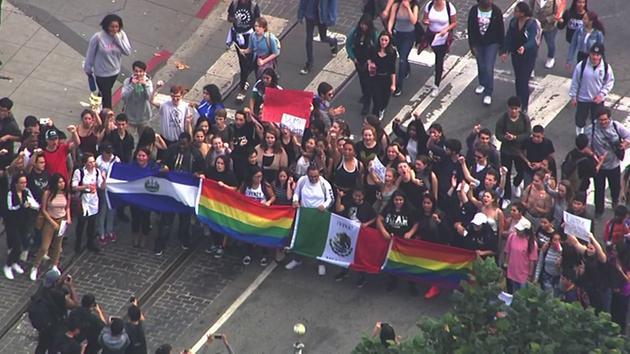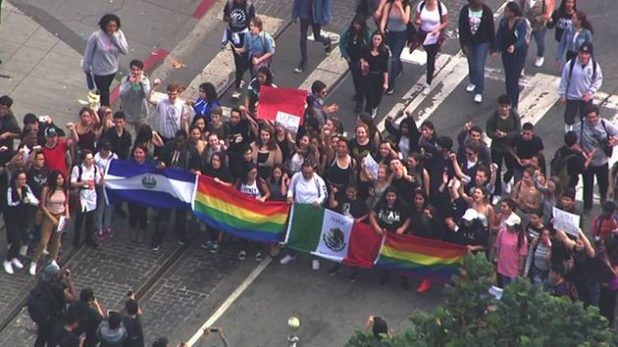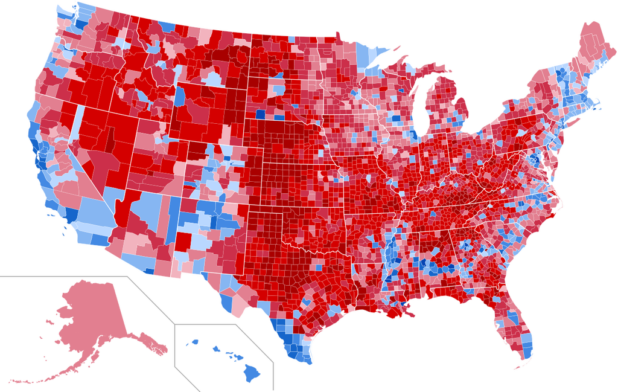Atlantic Centurion
November 12, 2016
Grief. Fear. Hysteria. Anger. Protests. Riots. Hate crimes. Arrests. The United States is reeling from the election of President Donald Trump. Ultra-liberal Portland and Seattle revolt as anarchists light fires and smash storefronts. Megadiverse New York City has to impose a no-fly zone over 5th Avenue. LGBT and Mexican flags wave in San Francisco outside high schools. Students in Michigan chant “Build the Wall.” Muslim women have their headscarves torn off. A White man is kicked in the head for being a suspected Trump supporter. Swastika graffiti appears anonymously on walls and doors around the country. Wow just wow, it’s the current year.
The results are still coming in from November 8th. President Trump won the electoral college while Hillary Clinton won the popular vote by a margin of hundreds of thousands. There are now increasingly loud calls to scrap the electoral college for being outmoded and ‘anti-democratic’. Moreover it is the second time in recent history that a Democrat has won the popular vote while losing the election.
Of course, there is a geographic context to all of this. Clinton got far more votes than needed to win in blue states like California and New York. In the West Coast outpost of Latin America, she got around 2.5 million surplus votes, while Shekel Island and its surrounding counties (sans Staten Island) returned around 1.5 million extra ballots. In midsized swing states like Pennsylvania, Michigan, and Wisconsin, President Trump won by much narrower margins, boosting Clinton’s popular vote even further. And the high margin Republican states have less population to begin with, yielding less popular vote for President Trump’s total. Still, there is a clear geographic component to where Clinton won the popular vote, and that is her carrying the urban corridors of the Northeast and the West Coast, and the Deep South’s black belt. President Trump won the broader swathes of the interior and the non-urban counties.
So what’s the path forward for a Trump administration elected due to a procedural quirk in the system (which usually doesn’t matter) while sitting atop a colorful demographic bomb? What’s the strategy for the American left, who even if they ride out the demographic trends and campaign as inverted paleocons next cycle will have a country where at least 40% of the population is viciously opposed to their coalition of Davos men, overseas Israelis, and their multi-ethnic helots? Is the future of the United States to go through the death throes of Empire as it swings radically left and right every few years because of ethno-regional partisan politics? Do we really want a vicious cycle of the coasts and the core fighting one another to convince a few border regions to flip one way or the other every four years? This is the best form of government we have? This is the best country in the world?
Well, there are a number of scenarios in which the United States survives intact as a darker or off-white world power, depending on who wins in the mid-game. But for now, President Trump holds power, with both houses of Congress and the executive branch at his disposal starting January. To the mock-horror of the left, there are “no” checks and balances against him (wrong). Even if that were the case, his position is the definition of tenuous, and unless he acts to entrench himself and his allies, it will have all been for nothing. A smart move for President Trump would be to lay the groundwork for an authoritarian and nationalistic deep state, given that he has four (and possibly only two) years of mandate to turn around a country which has had decades of misrule and cultural poison, one that only was able to vote him into office by the skin of its teeth. It could be done. After all, he did run on a platform of building things, bigly.
But I think there’s something to be said for a utilitarian solution, or at the very least a utilitarian starting point for the conversation on where this deeply divided behemoth of a state is going. What do people really want in this country to be happy, and how can those demands be accommodated? Let’s assume I care for a moment and am not a completely self-interested tribalist (which would frankly place me in the minority of voters). Let’s assume I want to bring about the greatest good for the greatest number of people regardless of ingroup-outgroup status while following the principles declared in the United Nations’ charter.
From a utilitarian standpoint, I don’t think the optimal solution to the American problem is endless political struggle between conservative Whites versus people of color and their liberal allies over control of an imperial state. I think that’s a recipe for polarization at the national level, and fueling radical ethnocentrism among Whites (who currently split around 60-40 on politics while other groups are as high as 90-10). How can these people share a country amicably where the rules of the game are winner-take-all, damn the losers to sit in the corner and lick their wounds?
I think the solution is patently obvious, albeit with a number of logistical hurdles (which pale in comparison to say, building nuclear weapons or the Moon landing). Partition the United States into multiple countries. There could be at least two multi-ethnic liberal countries and one more homogenous conservative country. Of course, each would have ideological minorities, but there would no longer be a high stakes competition to overturn society and reorder it along an inverse set of principles every few years on the basis of two camps of regional extremists attempting to sway moderates.
You may be wondering, if new states with different political alignments were created, wouldn’t that change the internal Overton window of each society and thus lead to new factions, ideologies, and tensions not even given consideration before? It probably would, but the trend would be of each society being able to pursue the policies it really wanted to before but couldn’t due to opposition from de facto foreign factions. If only there were fewer conservatives, Bernie Sanders could have dropped the “democratic” and been a full-tilt gibsmedat socialist. Donald Trump wouldn’t have had to give lip service to the concerns of blacks who refused to vote for him if they simply didn’t live in his country. The West Coast would finally be able to adopt third worldist cultural and economic policies and left-technocracy without reservations, without opposition from the interior. Boston-NY-Washington could have its dream bureaucratic welfare superstate, constantly seeking new clients to provide social services to at the expense of its signaling-addicted upper classes, with no significant anti-immigration movement opposing it. The Whiter, more conservative parts of the country would be able to adopt nationalism and traditionalism. Instead of having to compromise with people they dislike on a molecular level, these factions would be free to govern their regions with only minor internal opposition, as opposed to swathes of the state they control on behalf of the 51% being up in arms against them (metaphorically, and possibly literally).
But I am an ethno-nationalist. So I do want what is best for my tribe first and foremost. But I also happen to think that the same things I want for my own tribe would be good for other tribes as well. It is said that good fences make for good neighbors after all. What better place to put a fence than between the sanctuary cities that believe White people are devils and people of color are angels, and the rest of the country?


